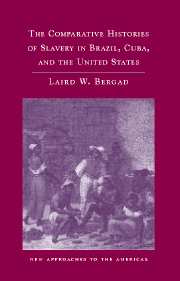Book contents
- Frontmatter
- Contents
- List of Maps and Figures
- Introduction
- 1 From Colonization to Abolition: Patterns of Historical Development in Brazil, Cuba, and the United States
- 2 The Diversity of Slavery in the Americas to 1790
- 3 Slaves in Their Own Words
- 4 Slave Populations
- 5 Economic Aspects
- 6 Making Space
- 7 Resistance and Rebellions
- 8 Abolition
- Bibliography
- Index
- Plate section
8 - Abolition
Published online by Cambridge University Press: 05 June 2012
- Frontmatter
- Contents
- List of Maps and Figures
- Introduction
- 1 From Colonization to Abolition: Patterns of Historical Development in Brazil, Cuba, and the United States
- 2 The Diversity of Slavery in the Americas to 1790
- 3 Slaves in Their Own Words
- 4 Slave Populations
- 5 Economic Aspects
- 6 Making Space
- 7 Resistance and Rebellions
- 8 Abolition
- Bibliography
- Index
- Plate section
Summary
The United States, Cuba, and Brazil were the last nations in the Americas to abolish slavery. The Civil War (1861–65) ended slavery in the United States. Spain had little choice but to begin the dismantling of slavery in Cuba in the aftermath of the Ten Years' War, a violent rebellion for independence that raged from 1868 to 1878 in which abolition became a major issue designed to attract slaves to the revolutionary cause. Brazil, which held out the longest, finally succumbed to abolitionism in 1888, largely because of extraordinary domestic and international political pressure but without any cataclysmic violence, as was the case in the United States and Cuba.
Prior to slavery's abolition, the transatlantic slave trade had been gradually dismantled, largely because of concerted British efforts to end first slaving and then slavery. A British-American treaty of 1807 ended the slave trade to the United States and the British colonies in 1808. Britain, which took the international lead in exerting pressure upon both Spanish Cuba and imperial Brazil, forced various accords to abolish the slave trade upon each country. These were largely ineffective. Spain signed treaties ending the Cuban trade in 1817 and again in 1835. In 1862, British naval patrols had been given free rein to search suspected slave ships flying any flag, including those of the United States, and this increased pressure upon the Cuban slave trade. However, slaving continued until 1867 and the aftermath of the U.S. Civil War.
- Type
- Chapter
- Information
- Publisher: Cambridge University PressPrint publication year: 2007

